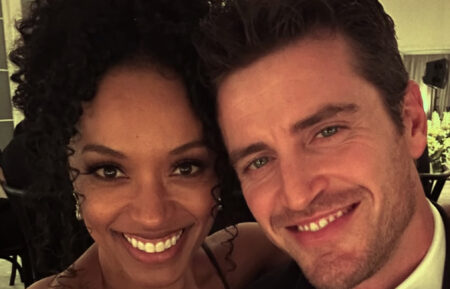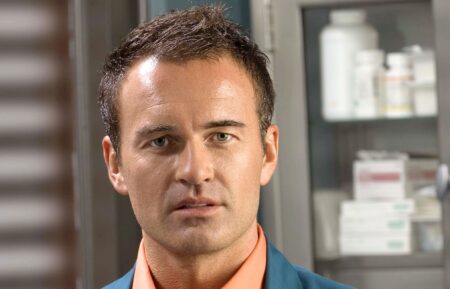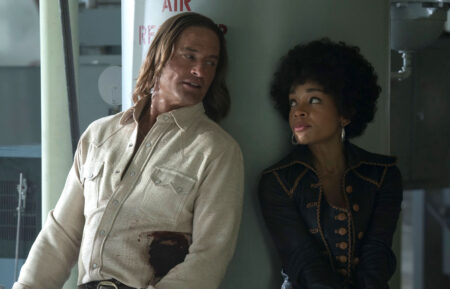‘Supergirl’ Good Guy Chris Wood on His New Mental Illness Awareness Week Initiative and Where Mon-El Has Been
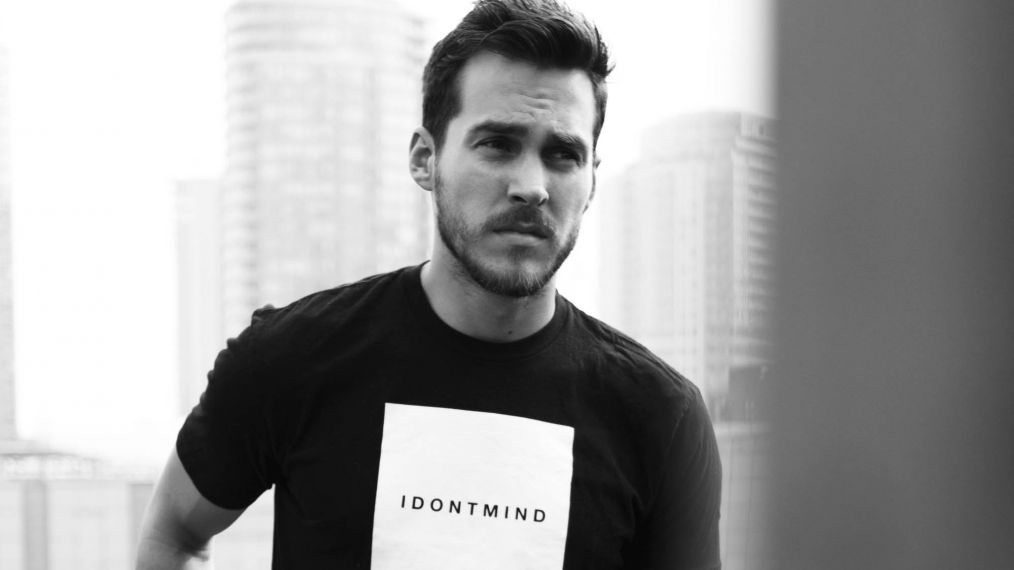
Q&A
On Supergirl, Chris Wood has the luxury of special effects, stuntmen and scripts to make him a hero as Mon-El.
But in his personal life, the actor has endured the kind of storyline that all too often doesn’t end with somebody saving the day. So he has taken that upon himself. When he was in his early 20s, the Ohio native watched helplessly as his father fell prey to an undiagnosed mood disorder.
“It tore my family apart,” he writes on his new website, IDontMind.com. “No one knew how to deal with it, how to get him help. After months of no success and a quintuple bypass surgery that finally landed him incapacitated in a hospital, I was able to get him committed and into a state facility which, unfortunately, used a medicate and isolate philosophy of ‘treatment.’
“After two months he was released, and he began taking huge strides on the road to recovery, but the year of mental illness had caused his body too much physical damage. He died suddenly of heart failure in the midst of healing.”
No longer content to keep this tragic experience in the shadows, Wood has developed IDontMind.com—which launched in tandem with the start of Mental Illness Awareness Week (observed annually the first full week in October; this year it is Oct. 1-7, 2017)—to provide “help for those who are struggling [and] to prevent stories like my father’s from happening again and again.”
Here, Wood discusses the initiative’s roots, his own journey to mental wellness and, of course, what we can expect when his Mon-El finally returns to National City.
OK, so I’m a big Mon-El fan…
Chris Wood: Oh, good, I’m glad. I’m glad to hear it. [Laughs]
How soon do we find out where he went and what he’s been doing?
You know, sort of right away. Obviously, that’s a central part of the story for Kara (Melissa Benoist), in terms of where he is and if she can get him back and all that. I can’t say specifics on when he comes back, but there are some subtle hints that start coming in the first couple moments of the season opener, and they try to piece together what’s going on. It sort of comes out of left field, his return, if you will.
Usually when superheroes go missing, it’s never into a good place. They never disappear into paradise. It’s always some hellhole.
Yeah, there is a long-standing history of that not being a great thing. He’s going to be a very different Mon-El than what we saw last year, largely due to the whole mystery surrounding where he went and what he’s been doing. It definitely affects him. He’s been somewhere, doing something. [Laughs]
That is not vague at all!
But it’s completely shrouded in mystery and they’ve sworn me to secrecy on specifics, but there’s going to be a big change in him when he comes back, too, that worries the team.
Without giving anything away, have you been outfitted for a new costume this season?
Believe it or not, I had a costume last season that I did fittings for before we even started! It was built and ready to go, but the way that the story played out, I think that the producers felt that revealing the suit too early, when Mon-El was still figuring it out, wasn’t going to be as impactful as getting him in a suit when he’s actually had that heroic breakthrough. You know, when he’s actually feeling, from his core, motivated to do good, as opposed to being told, “Hey, you should do good,” right?
So there always has been a suit, and I can promise that there actually will be sightings of it this year. I wasn’t lying last year when I said that there was a suit. It’s just they changed it, and we just never saw it. It is around the corner.
Is it one of those suits where you don’t get to have donuts anymore?
[Laughs] I think all superhero suits have some level of that due to the exact fitting. But there are donuts on set, and it’s an uphill battle for all of us. That’s not an exaggeration…there is just a platter of donuts at all times on the craft table, and it’s very challenging.
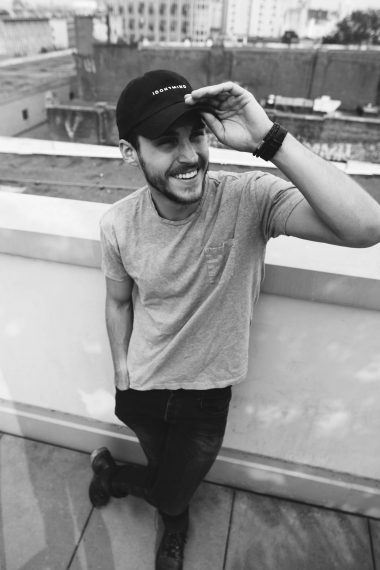
You just launched your initiative, IDontMind.com, as part of Mental Illness Awareness Week, and I am blown away by this. This had to be absolutely the hardest thing you’ve gone through. Your father suffered a mental breakdown that affected his physical health, which then claimed his life?
Yeah. It was one of the more defining moments of my life, going through that experience and giving myself the time to go through all the processes that I had to go through to get on the other side of it. Not that I can ever look back and think it was a good thing that that happened to my family, but I am just trying to turn something horrible into something positive for other people. It’s so crucial to me to really honor my father and try to shed light on a cause that’s still sort of in the dark.
So was it six years ago that he passed, or six years that he first started showing signs of a mood disorder?
When he passed. It was about a year before he actually passed away that we started noticing some erratic behaviors and all that. I’m not an expert in diagnosis, and it’s such a confusing world anyway. It’s hard to combine a bunch of symptoms and classify it in mental health anyway, because it’s all so different.
And it’s not that my father didn’t have any problems his whole life, and then all of a sudden had this happen to him at the age of 59. What it was more so is the fact that he felt like he couldn’t speak up about having problems throughout his whole life. You know, my dad was never sick. My dad would fight through colds and go to work. If he did get sick, he’d be home for one day, and he’d stay in bed and sleep all day, and the next day, he went back to work, because he was the man of the household, and he wanted to be healthy, and that was what he was taught of the world.
Doing an Instagram Live on Sunday at 1pm EST. Tweet me some questions! And I may have some exciting news to share… pic.twitter.com/D13ttzXrNX
— Chris Wood (@ChristophrWood) September 28, 2017
In a way, our dads are our first superheroes.
Totally. I saw my dad as being a superhero. But now I am finding the truth that it’s okay to admit when we’re having problems and when we’re not feeling right. I see it all around me, in my friends and in my family, of people having the impulse to seek help, but knowing that this specific area is not [openly discussed].
You know, if you’re having heart palpitations, you’re like, “Hey, something’s wrong.” But when you’re having suicidal thoughts or you’re anxious or you’re feeling overly excited and you register that it’s a not normal feeling, people are scared to admit that, because people are going to perceive you as something negative.
So much of mental illness is still so stigmatized for people of all ages.
Yeah, it’s work that needs to be done early and maintained throughout our lives. Just as we focus on eating right and going to the gym and staying active, I don’t know why our minds have become the thing that we don’t focus on in regards to our health. It’s vital to our survival that we take care of our minds and mental health, that we listen to the warning signs—a large part of the reason that we ignore the warning signs is because there is such fear and shame surrounding mental health.
A lot pf people don’t want to have to admit that they’re having a problem, which is sort of the inspiration for the concept behind I Don’t Mind. We’re taking a common phrase that, out-of-context, you wouldn’t necessarily associate with anything and making it a mantra for a movement. It’s about allowing people to say “I don’t mind” and stand up against the fear and shame, to be willing to admit when we’re having a problem and not caring what the world’s perception of us is.
And that is not just for the person suffering. For the allies or friends or loved ones of those going through this, I feel like I Don’t Mind also speaks to the idea of letting someone know they don’t mind listening to them talk about their problem. Especially young people. “Tell me about this. I don’t mind hearing this. I am here for you.”
Absolutely. If each person starts to do that, it’ll impact the people around them, and, ultimately, the world’s perception of what it is to be mentally ill. It’ll save a lot of lives and it’ll help a lot of families from breaking down like the way mine did.

When did you come up with the concept of doing this initiative?
It’s been a couple years of me knowing that I wanted to do something. I was working in the mental-health world as an advocate and speaking out on the cause, but I didn’t have my own agenda for what I wanted to contribute. Then this fell into my lap, this little pocket of stigma awareness surrounding mental health that I felt wasn’t being approached in a way that I felt would be the most successful. And like you just said, starting with the youth and young adults, teaching them now about mental illness is how we’re going to change the perspective.
That is something you didn’t have when your father was hospitalized.
Thinking back to when I was a teenager, if someone said, “Hey, wear this shirt that says ‘Mental health is cool. You suck,'” I might have realized I was going to get made fun of and that was going to add to the problems I was already going through by inviting more criticism. So we have found a phrase that you might see on a hat anyway, because people wear shirts that say nothing phrases all the time, and by having a meaning behind it, the hope is that something simple like “Hey, I like your shirt, what does it mean?” people can then say “Oh, it’s actually a mental health awareness campaign.” And now we’re having a conversation, now we’re talking about mental health, which is the whole thing is that everyone’s terrified to open up about.
You wouldn’t believe the number of conversations I’ve had that start with, “Hey, what’s that you’re working on?” “Oh, it’s actually a mental health campaign. This is what I went through.” “Oh well, my brother or I went through this or my best friend …” Everyone has something in their life that connects them to this cause, and for some reason, there’s still so much fear to speak about it. So having something on a hat or an “I Don’t Mind” t-shirt is this very simple tool to unlock a conversation can be crucial.
How did you your family handle your father’s illness and death? Because when somebody gets sick, either physically or mentally, it impacts those who love them as well.
Yeah. It affects the whole family, and one of the big problems I had was that I couldn’t seem to find anyone who could help, because it’s such an unspoken problem [and] because when the mind is sick, sometimes the person suffering can’t recognize with their sick mind that they’re not feeling well. Sometimes, the feelings are euphoric and fantastic, and that was the case with my father in the midst of mania. He thought he was better than he’d ever been, so he couldn’t hear his loved ones telling him that he needed help.
And, again, that is something that I think a shift in our perception of mental health and removing the stigma will help with: When someone you trust and love, when multiple people in your life, everyone that is important to you and close to you, is telling you that you need help, if we’re not scared of seeking help and not scared of admitting a problem, then we’ll be more open and receptive to people pointing out that our behavior has changed.
It’s really does all start with perception, huh?
It’s hard not to look at stigma as the whole crux of the problem. If that changes, everything else will follow, including all the important legislative work and educational work that programs like the National Alliance on Mental Illness are doing. It all starts with our perception of it. What will IDontMind.com be offering?
What will IDontMind.com be offering?
It’ll be pretty simple. It’ll have information and resources to get people access to hotlines and information about different mental illnesses and treatments. The target is to have something that’s very direct and inspiring, that gets people excited about being a part of the movement and joining the campaign.
When you’re going through it, sometimes you feel very alone and you’re not, and that’s the importance of I Don’t Mind. It’s really about saying “I don’t mind speaking out about my problems. I don’t mind admitting that I have a problem, and I don’t mind that you do, and I don’t mind that your sister does, and I’m here to support and not judge and hope that we can help make the world into a place it’s more about acceptance and understanding for those living with mental health conditions.”
What have you done to take care of your own mental health since this all started?
I had never gone to therapy before my father’s illness. It was something that I’d thought about a couple times, but I grew up in Ohio, and it wasn’t as talked about there much. Now I live in L.A. and New York before that, and in those cities, it’s a bit more like an “I grab my coffee, hit my therapist up” kind of culture. It’s a little more casual. But in the middle of America where I grew up, it was a little more taboo, so I kept putting it off, and I kept being like, “Well, do I really need it? Do I really have a need to go talk to somebody?”
And you did.
Oh yeah. Therapy has changed my life. I love going. I love the feeling—even if sometimes it’s a little bit uncomfortable afterwards for a second—of that release of getting to talk to someone who’s removed from your entire situation and who you can be fully transparent with.
With our loved ones and our significant others and our best friends even, there’s going to be things that we color in certain ways, because we want them to think of us a certain way or we don’t want to share a dark thought that we’re having. So it’s great having someone neutral who is a soundboard and also can help guide us through these difficult things, from both our childhood and our present lives. I think we release these completely unnecessary burdens and live much happier and smoother lives.
I’ve found complete healing through talking to someone. It’s not like they hook you up to electrodes and it’s this big scary thing. It’s very comforting and easy, and it’s just a conversation. And even for people who can’t find a therapist or can’t afford to have that, finding someone in your life that you can actually talk to about the things that you’re scared of is equally important. That, for me, was the biggest key.
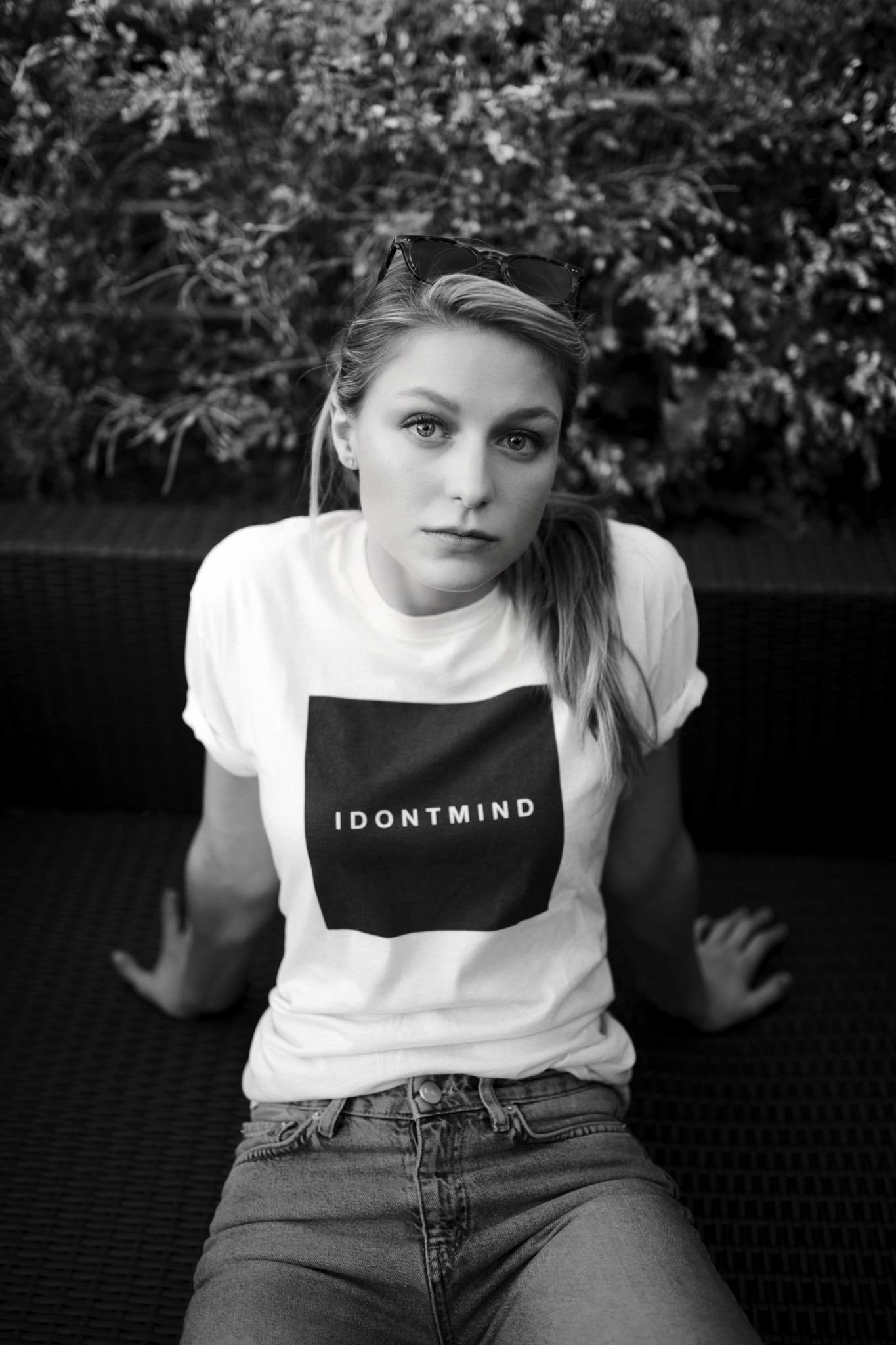
‘Supergirl’ star Melissa Benoist wearing one of I Don’t Mind’s tees.
You have made some famous friends now. Anyone helping out with the campaign?
On Supergirl, the entire cast is joining me on this, as are some of my friends from other shows and people that I’ve met in and out of the business. It’s been really amazing, actually, the support that I’ve gotten when I’ve told people that I was doing this. And getting NAMI, the National Alliance on Mental Illness, on board was huge, because it just expands our possibilities. It helps us utilize their resources in a way that furthers the purpose and mission behind I Don’t Mind and it also circles back to being able to contribute to their programs, like their helpline and their education tools for schools. It’s been a terrific partnership so far.
As hard as I am sure it was for you to get to this point, I love the fact that you’re not just slapping your name on some cause. You have skin in this game.
Sometimes it feels like I left some on the pavement. [Laughs] What I’ve found is that this was the thing I didn’t realize I was waiting for. I was waiting for someone to take those things that I felt and wanted to do and do it for me. It’s actually an amazing life lesson…I’m sure you hear and feel that in your life at times too; it’s like if you want something done, you just have to do it yourself. You just have to.
Especially with something like this, because not a lot of people are stepping up and putting it out there like you are.
And that’s the whole problem. If everyone just waits and says, “Well, it’s too hard,” then the conversation never starts. But with effort, persistence and, I think, important messaging for a cause that needs to be pushed out into the front lines, you find people who will help you. That’s what happened as soon as I started this. All of a sudden, people started popping up right when I needed them to help make this happen. And thank you for helping us get it out there, too.
Supergirl returns for Season 3 Monday, Oct. 9, 8/7c, The CW
INSTAGRAM @IDONTMIND






